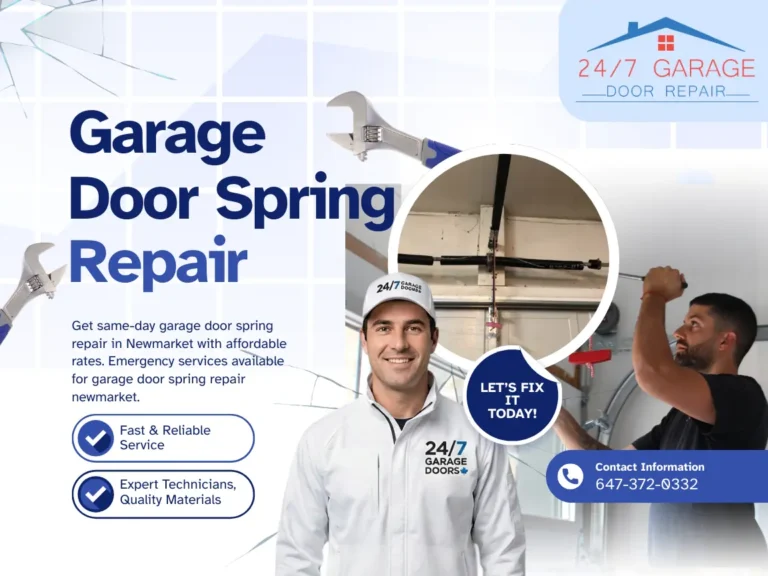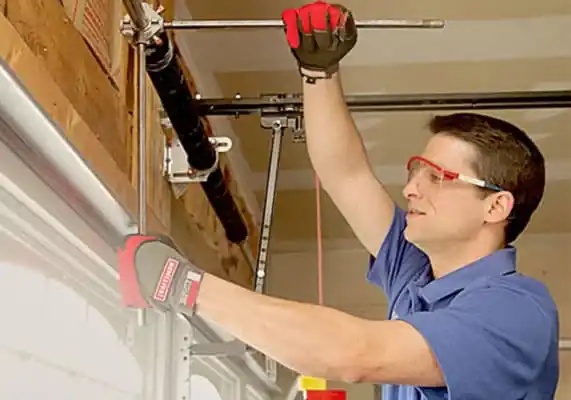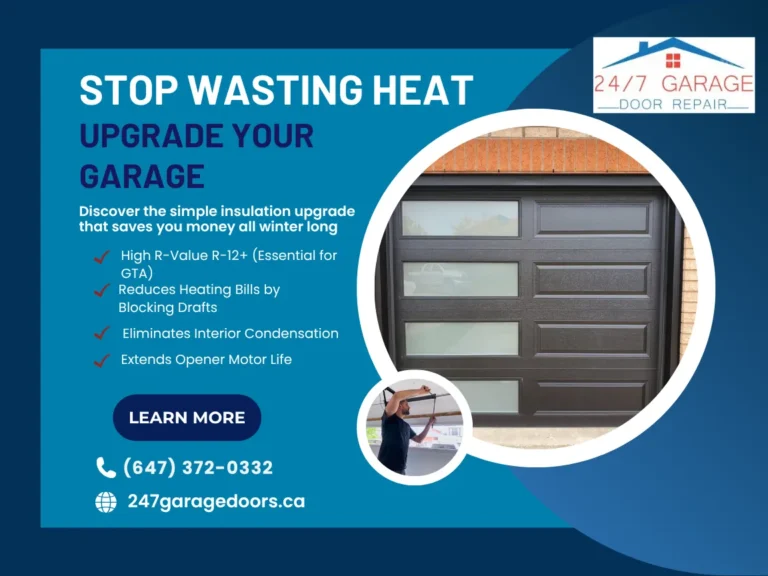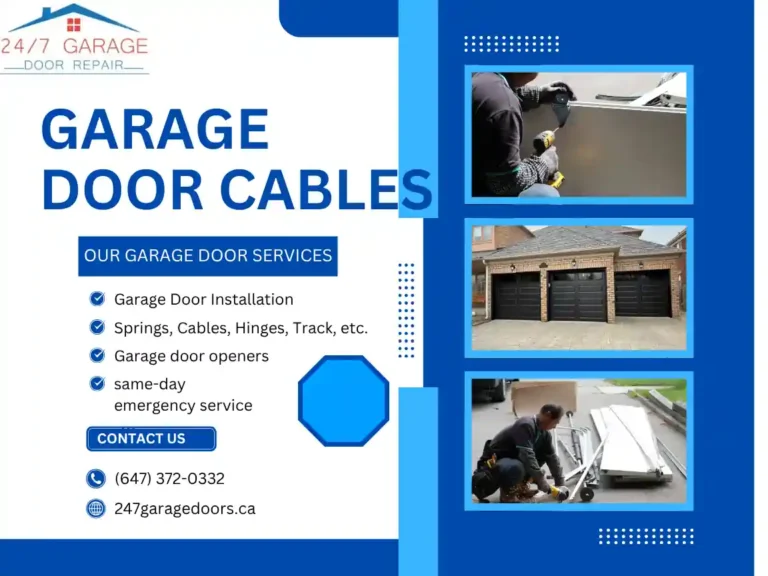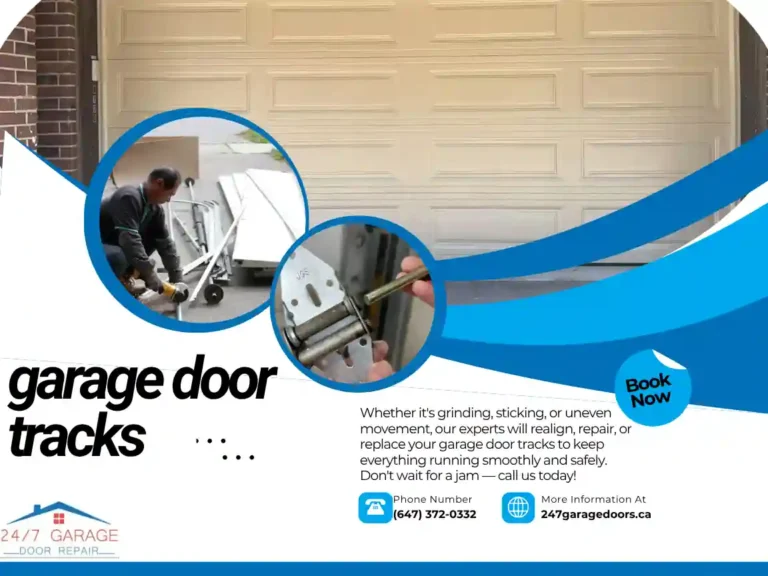A dependable garage door opener is pivotal for modern living—offering secure, weather-protected parking and easy access to your home. Yet, even top-tier systems can break down over time. Seeking garage door openers repair solutions early can save you from costly emergencies, potential security breaches, or the inconvenience of being locked out.
This guide delves into typical opener hiccups, practical do-it-yourself checks, and when calling a professional is the smartest route. We’ll also address Ontario-specific challenges—like cold winters, power outages, and rust-inducing salt—that can hasten wear on door mechanisms. Whether you have a basic chain-drive unit or a high-end, wall-mounted opener, knowing how to troubleshoot and where to seek expert help will extend the life of your system and protect your investment.
Why Garage Door Openers Repair Is Essential
Garage door openers serve a host of vital functions for Ontario homeowners, and timely garage door openers repair ensures you maintain:
- Convenience: No more braving harsh weather to open/close a heavy door.
- Security: Modern openers often feature rolling codes or smartphone integration that deters thieves.
- Safety: Auto-reverse sensors and force limits minimize accidents.
- Property Value: A stable, quiet opener can boost home resale appeal.
A malfunctioning system can disrupt daily routines. Prompt garage door openers repair not only keeps your door working but also safeguards your home.


Common Garage Door Openers Repair Issues and Their Causes
Uncovering why your opener misbehaves is the first step toward a fix:
Unresponsive Remote
- Dead Batteries: The simplest culprit. Swap them out and re-test.
- Signal Interference: Household electronics or neighboring devices can weaken remote range.
- Lock Mode: Some wall consoles have a lock feature, disabling remotes.
Inconsistent Door Travel
- Dirty or Misaligned Sensors: Photo-eyes force a door to stop or reverse if blocked.
- Worn Drive Components: Chains, belts, or screws may lack lubrication or have stripped gears.
- Incorrect Force/Limit Settings: The door might not fully open or close if travel dials aren’t adjusted properly.
Loud, Grinding Noises
- Loose Hardware: Bolts and brackets loosen over time.
- Dry Rollers/Tracks: Metal-on-metal contact leads to squeaks.
- Belt or Chain Slippage: Overly slack chains or belts can slip on sprockets.
Overheating or Motor Failure
- Short Cycles: Running the opener repeatedly without a break can overheat the motor.
- Electrical Issues: Power surges, faulty wiring, or circuit board damage can render the motor inoperable.
Recognizing these common garage door openers repair issues helps you decide if a quick DIY solution will suffice or if it’s time for professional intervention.
DIY First Steps
You can often resolve minor snags before seeking emergency opener repair services:
Power Source
- Check if the outlet works by plugging in another device.
- Inspect opener cords for fraying or loose connections.
Remote and Keypad
- Change remote batteries.
- Reprogram if signals drop repeatedly.
Clean & Align Photo-Eyes
- Dust or cobwebs block infrared beams, causing constant reversals.
- Ensure sensor LEDs glow steadily when aligned.
Lubrication
- Use silicone-based or manufacturer-approved lubricants on chains, belts, and rollers.
- Avoid thick greases that attract debris.
If these simple fixes don’t restore function, more advanced garage door openers repair tactics may be necessary.
Advanced Opener Troubleshooting
Even the best local opener technicians follow systematic checks:
Drive Mechanism
- Belt Tension: Loose belts slip on sprockets. Tighten to recommended specs.
- Chain Wear: Elongated chains skip links, causing jerky movement.
- Screw Drive Lubrication: Ontario’s cold can thicken standard lubes.
Force and Limit Adjustments
- Travel Dials: Ensure the door fully closes or opens without leaving gaps.
- Force Sensitivity: The opener must reverse on contact with objects, preventing accidents.
Circuit Boards
- Burnt Odor: A giveaway for overheated electronics.
- Capacitor Failures: If the motor hums without moving, the capacitor might be shot.
If you’re not sure about tinkering with electronics or internal gears, consider calling garage door openers repair pros.
When to Hire Best Local Opener Technicians
While some tasks suit handy homeowners, certain conditions demand professional skill:
- Spring Replacement: Torsion springs store lethal tension.
- Burnt Boards or Wiring: Electrical repairs can void warranties or pose fire risks if mishandled.
- Major Gear Overhauls: Worn sprockets, stripped screws, or cracked motor housings.
- Repeated Failures: Multiple minor fixes can become costlier than a correct pro service.
Ontario’s harsh climate only amplifies minor flaws, so a trained eye can spot and fix deeper issues.
Garage Door Openers Repair vs. Full Replacement
At times, even advanced opener troubleshooting can’t salvage an older or severely compromised system:
- Frequent Breakdowns: If you’re scheduling repairs more than once or twice a year, an upgrade might be cheaper.
- Obsolete Tech: Lack of rolling code security or missing battery backup features could leave you vulnerable or inconvenienced.
- Excessive Noise: Older chain-drive models may cause household disturbances.
- New Door Installed: Heavier, insulated doors require stronger motors.
Balancing parts-and-labor bills against the cost of a new unit clarifies if it’s better to continue with garage door openers repair or invest in a replacement.
Table: Professional vs. DIY Repair Tasks
| Repair Task | DIY Difficulty | Professional Benefit |
|---|---|---|
| Lubricating chains, rails, rollers | Low (Easy) | Quick service call not usually needed |
| Replacing remote batteries/keypads | Low (Very easy) | Spare yourself a trip if you have spares |
| Adjusting photo-eye sensors | Medium (Basic tools) | Techs ensure precise alignment, run safety test |
| Tuning force & travel limits | Medium (Read manual) | Pros calibrate seamlessly to reduce stress on motor |
| Replacing broken springs | High (Dangerous) | Proper tensioning, no injury risks |
| Overhauling motor gear assembly | High (Advanced) | Preserves warranty, ensures correct reassembly |
If you feel uneasy about overhead tasks, heavy parts, or electrical wires, a professional call may be the safer path.
Cost Factors for Garage Door Openers Repair
Service Call Fees
Ontario repair shops charge $50–$100 to diagnose issues on-site. That fee may apply to labor if you proceed with repairs.
Common Replacement Parts
- Gear Kits: $30–$60 plus labor
- Circuit Boards: $80–$150+ depending on brand
- Remotes/Keypads: $25–$70 each
- Belts or Chains: $50–$100 for the part alone
Larger Repair or Overhaul
- Motor Assembly: $150–$300+ when factoring in labor
- Spring Replacement: $150–$300+ if discovered mid-service
- Rollers, Hinges, Tracks: $20–$200 additional if door hardware is worn
Comparing these expenses with a new opener (often $300–$700+ installed) helps determine the more cost-effective route.
Adapting to Ontario’s Climate During Garage Door Openers Repair
Ontario’s weather extremes can wear down opener components:
- Sub-Zero Temperatures: Standard lubricants can turn gummy. Opt for cold-weather formulas.
- Salt & Rust: Clean metal rails, brackets, and hardware regularly to avoid corrosion.
- Power Outages: Battery backups are especially handy when ice storms or heavy snow disrupt electricity.
Proactive climate-specific maintenance lengthens the time between repairs.
Practical Maintenance Tips to Reduce Opener Repairs
- Check Sensor Alignment Monthly: A slight nudge can offset them, causing frustrating reversals.
- Tighten Bolts: Vibrations from daily use loosen motor, rail, and bracket hardware.
- Lubricate Metal Parts: Minimizes friction and noise while extending gear life.
- Test Auto-Reverse: Place a small object under the descending door; immediate reversal indicates correct force settings.
- Yearly Professional Tune-Up: A tech can spot micro cracks in gears, frayed cables, or misaligned rails early.
Simple routines like these drastically cut the need for garage door openers repair calls.
Garage Door Openers Repair in Ontario’s Market
Many local providers offer emergency opener repair services, but not all deliver the same quality:
- 24/7 Availablity: Vital if a breakdown occurs late at night, leaving your home unsecured.
- Parts Inventory: Reputable shops often carry spares for common brands (LiftMaster, Chamberlain, Genie, etc.).
- Warranty on Repairs: Some guarantee labor for 30–90 days, giving peace of mind.
- Knowledge of Local Climate: Techs who understand freeze-thaw cycles and salt exposure do more durable fixes.
Reading reviews or seeking referrals helps identify the best local opener technicians near you.
Final Thoughts on Garage Door Openers Repair
A smooth-operating, dependable opener underpins daily convenience and home safety. While minor issues—like remote battery swaps or routine lubrication—can be tackled by a savvy DIYer, advanced garage door openers repair tasks often demand professional expertise. From adjusting drive mechanism tension to replacing critical electronic components, technicians ensure your system’s longevity and compliance with modern safety standards.
Keeping up with simple preventive measures—especially in Ontario’s challenging weather—further lowers the risk of abrupt failures. If you’re noticing repeated breakdowns or suspect your door is too heavy for the existing motor, consider whether a total unit replacement might be more cost-effective. Either way, timely attention and targeted fixes guarantee fewer surprises and a reliably secure garage.
Still unsure whether your opener needs a minor tweak or a full replacement? Check local resources like 247garagedoors.ca for expert guidance. For additional advanced tips on diagnosing opener issues, see this article. By combining proactive maintenance with timely professional support, your garage door opener will reliably serve your family for years to come.



